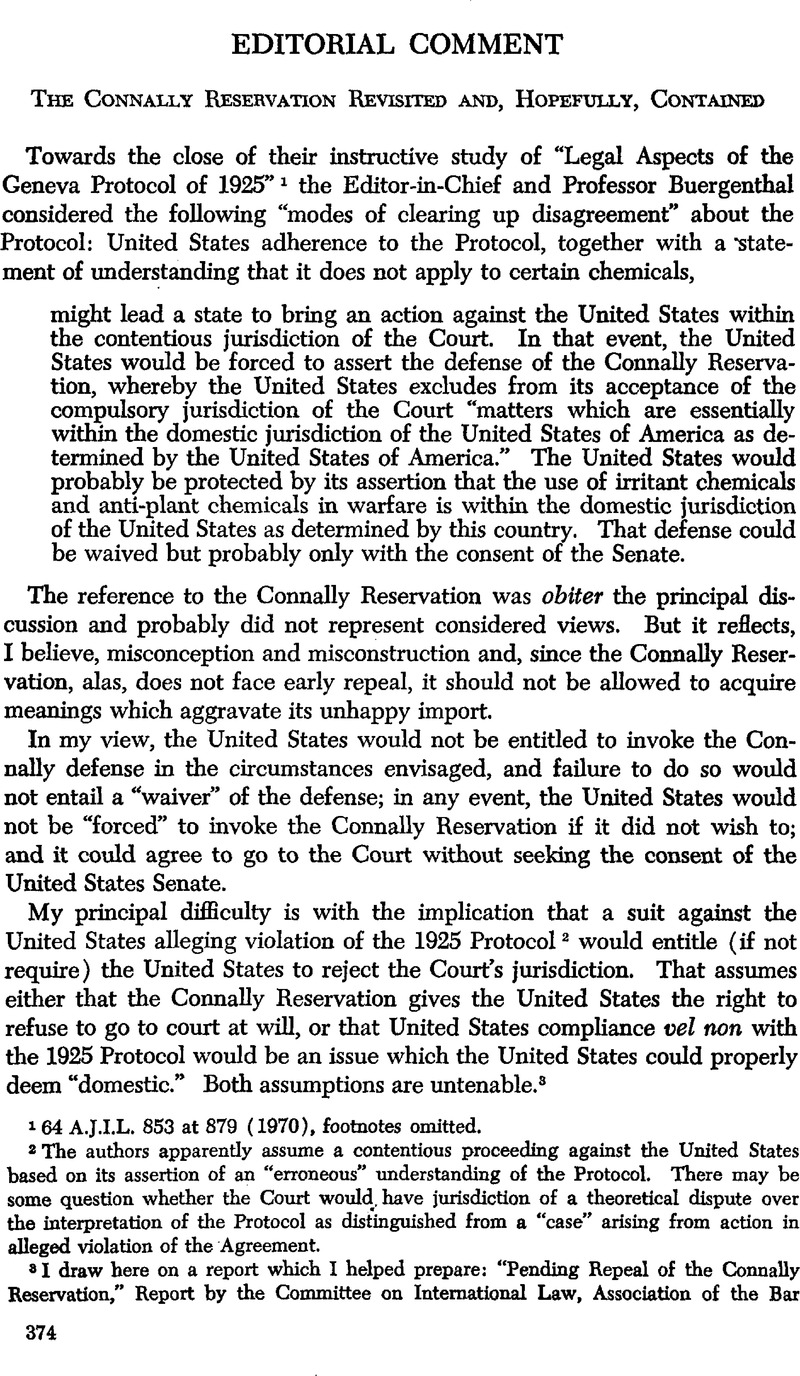Published online by Cambridge University Press: 28 March 2017

1 64 A.J.I.L. 853 at 879 (1970), footnotes omitted.
2 The authors apparently assume a contentious proceeding against the United States based on its assertion of an “erroneous” understanding of the Protocol. There may be some question whether the Court would, have jurisdiction of a theoretical dispute over the interpretation of the Protocol as distinguished from a “case” arising from action in alleged violation of the Agreement.
3 1 draw here on a report which I helped prepare: “Pending Repeal of the Connally Reservation,” Report by the Committee on International Law, Association of the Bar 374 of the City of New York, February, 1964, 19 The Record of the Association of the Bar of the City of New York 162 (1964).
4 Sen. Rep. No. 1835, 79th Cong., 2d Sess., pp. 1, 2, 5 (1946).
5 “The states parties to the present Statute may at any time declare that they recognize as compulsory ipso facto and without special agreement, in relation to any other state accepting the same obligation, the jurisdiction of the Court in all legal disputes concerning: a. the interpretation of a treaty; b. any question of international law; c. the existence of any fact which, if established, would constitute a breach of an international obligation; d. the nature or extent of the reparation to be made for the breach of an international obligation.”
6 92 Cong. Rec. 10695 (1946). See also the statements of Senator Huffman and Senator Ferguson, ibid, at 10696. Compare a former Legal Adviser of the Department of State: “Moreover, I have a serious question whether ‘as determined by the United States of America/ if fairly applied, would mean any more in the way of excluding the International Court from passing upon truly domestic issues than the words ‘as determined by the principles of international law.'” Becker, 1958 Proceedings, American Society of International Law 267.
7 Case concerning the Aerial Incident of 27 July 1955 (United States of America v. Bulgaria), I.C.J. Pleadings at 308, 322-325.
8 Ibid, at 676-677.
9 Ibid. 677.
10 Since the discussion assumed that the United States would not enter a reservation but only assert an understanding, and, under one of the options considered, would do so, not as a condition of ratification, I assume that the contentious proceeding envisaged would charge violation of the Protocol. If there were also a preliminary issue as to whether the United States had effectively entered a controlling reservation, that too, surely, would not be a domestic matter.
11 Perhaps the authors meant only that the United States would be forced to consider whether to invoke the reservation; or that it would have to invoke the reservation if it wished to block the suit; or that political forces within the United States might compel its invocation.
12 Compare the memorandum of the Legal Adviser of the Department of State, Eric H. Hager, in Hearings, May 17, 1960, before the Senate Committee on Foreign Relations, 86th Cong., 2d Sess., pp. 14-15, reprinted in 54 A.J.I.L. 941 (1960); compare also Bishop, and Myers, , “Unwarranted Extension of Connally-Amendment Thinking,” 55 A.J.I.L. 135 (1961).Google Scholar
13 The United States, having adhered to the Statute of the Court with Senate consent, the Senate could not later limit the power of the United States (or of the President) under Art. 36(1). Compare Fourteen Diamond Rings v. United States, 183 U.S. 176 (1901).
14 Under Art. 36(1), there is nothing to prevent the parties from submitting a dispute in which a preliminary issue is whether the matter in controversy is or is not “essentially domestic.”
15 See Report of the Committee on International Law, note 3 above, at 164-165.